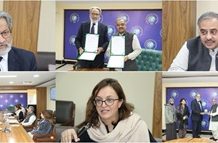It took a horrible and gruesome experience for Pakistan to jolt the political and military leadership out of their comfortable cocoons for some serious action against the terrorists and their organizations that have plagued the country. Seven attackers scaled the walls of an Army Public School in Peshawar on December 16, killing 142 people, 132 of them school children. Analysts and commentators called the incident the “9/11” of Pakistan. The responsibility for the dastardly act was immediately claimed by TTP (Tehrik-i-Taliban Pakistan) led by Mullah Fazalullah allegedly hiding out in the mountains of Kunar Province in Afghanistan bordering Pakistan.
Some of the immediate actions that were taken to strike against the terrorists included an instant visit by the Pakistan Army chief to Afghanistan for meetings with the Afghan president, the Afghan military commander and commander of the ISAF forces in Afghanistan demanding that Fazalullah be handed over to Pakistan and the immediate launch of comprehensive joint military operations against terrorists on both sides of the Pakistan-Afghan border.
While Pakistan has been carrying out a military operation in Waziristan, one of the seven tribal agencies, since June 2014, both the Afghan and ISAF commanders have now also assured Pakistan of their full support in the war on terror and eliminating terrorists on Afghan soil.
Another immediate step taken by Pakistan included the lifting of the moratorium on death punishment in force since 2008 following an agreement with the EU and a call for an All Parties Conference to come up with a consensus-based action plan within seven days that would weave the domestic political front seamlessly into the military front with both reinforcing each other in helping to root out the scourge of terrorism from Pakistan once and for all on an enduring basis. Prime Minister Nawaz Sharif also announced that henceforth there would be no delineation between “good” and “bad” Taliban.
Shunning all their differences aside, all the major political parties in Pakistan including the one led by Imran Khan that had been agitating over the last three months against the incumbent government of Prime Minister Nawaz Sharif for alleged misgovernance and fraud in the 2013 elections, sat down for long sessions to hammer out a National Plan of Action and a counter-terrorism strategy that would be acceptable to all the political and military leadership.
On December 24, with a few reservations by some of the religious parties, the All Parties Conference including both the political and military leadership gave consent to a 20-point plan of action which includes executions for terrorists sentenced to death. Implementation on this has already begun. It includes the establishment of special trial courts for a period of two years under military officers to deal with terrorists without delay. No armed militant group or organization will be allowed to operate in the country.
All funding for terrorists and terrorist organizations will be eliminated and banned organizations will not be allowed to re-establish themselves under another name. A special anti-terrorism force of 10,000 soldiers will be created. Action is being taken to stop religious extremism and protect minorities. Print and electronic media will be banned from glorifying the views of terrorists and terrorist organizations and reforms in Federally Administered Tribal Area will be given priority to ensure the speedy return of internally displaced persons.
Given the sense of outrage triggered by the carnage in Peshawar, there is now a growing realization within the country that this is indeed a turning point for Pakistan and the Taliban apologists within the country. The terrorists and their organizations, including the sectarian outfits in the province of Punjab, must no longer be provided space and need to be dealt with an iron hand, mere words and committees will not be enough this time around.
The Peshawar incident has put the support of the entire nation toward the narrative of zero tolerance in dealing with the menace of terrorism that has both internal and external dimensions. While it seems that the leadership in Pakistan has been able to give some shape to an ambitious internal narrative to deal with terrorists, it is imperative that the country also move to recalibrate its relations with neighboring countries in order to ensure a robust regional mechanism and support to counter terrorism.
Views expressed are of the author and do not necessarily reflect the views of ISS or of the Government of Pakistan.












